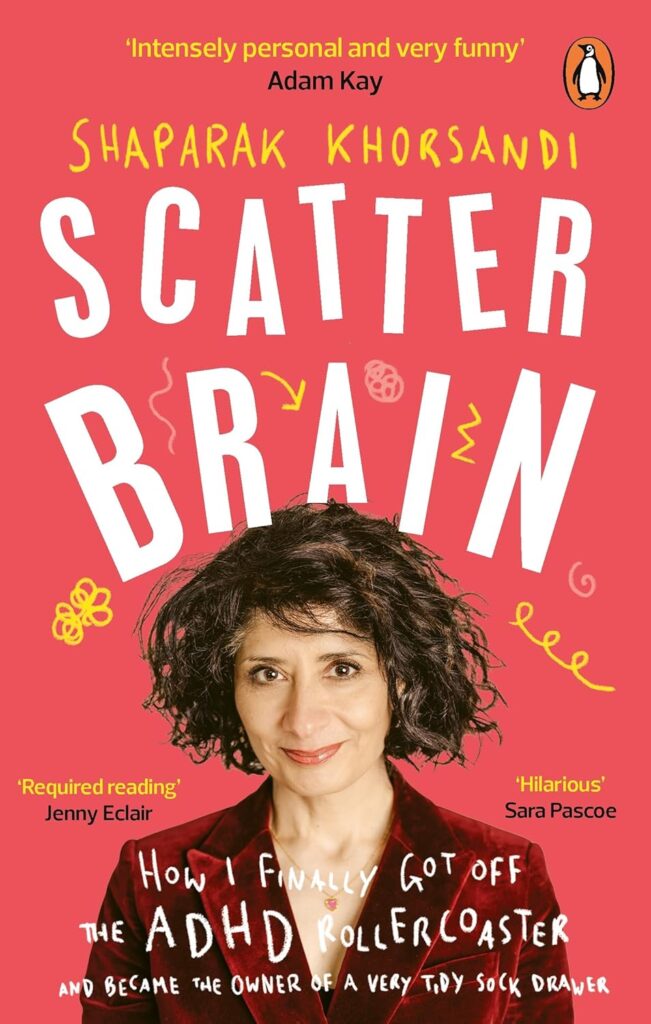Last weekend, the weather was lovely with sun and a slight breeze, making it a perfect time to get on with Spring gardening tasks. I spent several hours outdoors weeding, mulching, and planting spring bulbs. It was a great opportunity for some quality “me time,” and to keep my brain occupied, I listened to “Scatterbrain: How I Finally Got Off the ADHD Rollercoaster” by Shaparak Khorsandi. I also mixed in some movie songs to keep the energy up and avoid boredom. Here’s my take on the book and what I learned while tending to my garden.
First Impressions
The title “Scatterbrain” intrigued me, and I was looking forward to practical tips on identifying and managing ADHD. However, the book took a more personal and narrative-driven approach. Listening to the audiobook added a new dimension to the experience, making it feel more intimate and engaging, especially while I was manually pulling weeds and enjoying the beautiful weather.

The author shares her journey as someone with undiagnosed ADHD, describing herself as a scatterbrain, people pleaser, and adrenaline junkie. A significant portion of the book focuses on her early life and the challenges she faced, including feeling wronged as a child. This part of the narrative felt detailed and sometimes repetitive, which made me wish for more practical content.
My Reflections
I was hoping for more actionable advice on diagnosis and management. The book spent a lot of time on the author’s personal story, and by the time it reached the diagnosis and subsequent steps, it felt rushed. The conclusion was somewhat anticlimactic, with general advice to talk to a psychologist, get ADHD tests, and consider private options if affordable. These points were already familiar to me, which left me feeling a bit unsatisfied.
Despite the structure, the book was entertaining and provided general awareness about ADHD. The author’s storytelling was funny and relatable. Many of her experiences resonated with my memories and incidents. Here are a few key takeaways:
- ADHD and Accountability: The author’s statement, “ADHD is not an excuse for bad behavior,” resonated with me. It emphasizes personal responsibility even with neurodivergent conditions.
- Practical Tips: The author’s method of making a physical list and ticking off tasks was particularly useful. I often find myself writing and editing mental lists, and having a physical list helps me stay on track. It also reminded me how easily I can get distracted by emails, chats, or random thoughts, often completing low-priority tasks first.
- Neurodivergence Awareness: The book highlighted the commonness of neurodivergence and how it can manifest differently in individuals. It also touched on how social awkwardness in women is often dismissed as shyness without deeper consideration.
As I weeded and mulched, I found myself nodding along to the author’s descriptions of being easily distracted and the importance of physical lists. It feels like my whole house is neurodivergent to varying degrees. One of us constantly makes lists, another hates lists, and another lives in a dream world. I hope that by recognizing and understanding these differences, we can build a more supportive and harmonious home environment.
Measly Progress in the Garden
Despite spending hours in the garden, the progress was modest. Here’s a snapshot of the garden before and after all that work:


While it might not look like much, every little bit counts, and I’m proud of the progress. Gardening can be a slow and rewarding process, much like the journey described in the book.
Final Thoughts
While “Scatterbrain” didn’t provide the practical tips I was hoping for, it did offer a personal and relatable narrative that was both entertaining and enlightening. If you’re looking for a deeper understanding of ADHD from a personal perspective, this book is worth a listen. However, if you’re seeking more practical advice, you might want to supplement it with other resources.
Gardening and listening to the audiobook, interspersed with movie songs, made for a delightful and productive weekend. Despite the physical soreness from weeding, mulching, and planting, I found the combination of physical activity and mental engagement to be quite satisfying. It’s a reminder that sometimes, the journey is just as important as the destination.
Feel free to share your thoughts and experiences with ADHD or neurodivergence in the comments below. What books or resources have you found helpful?